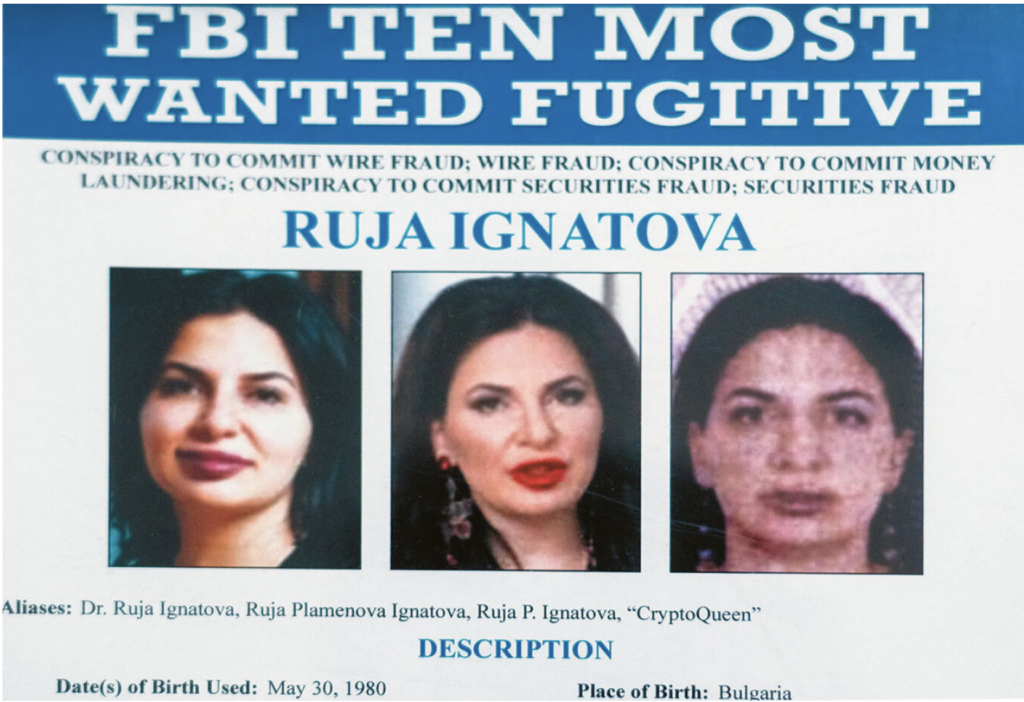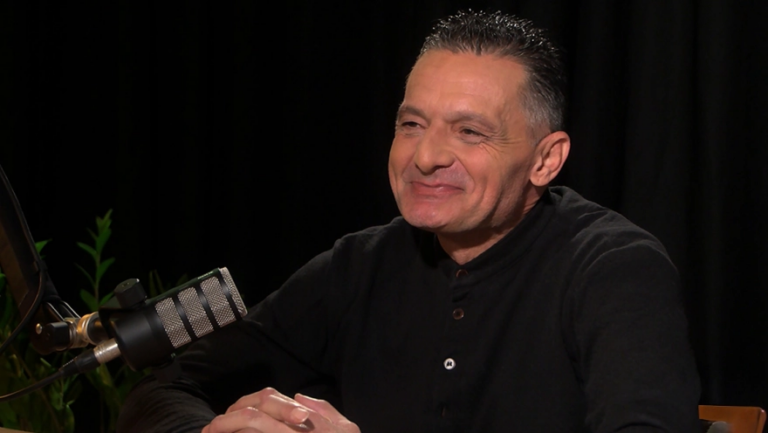Last Wednesday, the State Department announced that it was increasing the reward from $250,000 to $5 million for information leading to the arrest of one of the FBI’s top 10 most wanted men. This is Bulgarian billionaire Ruja Ingatova, who has been missing since 2017 in Athens.
Ignatova, the “queen of cryptocurrencies,” is wanted for what may be the biggest scam of all time from which she made more than $4.2 billion, defrauding millions of people in every corner of the globe: from big businessmen and members of royal families to breadwinners who invested everything they had in her.
Ignatova emerged as the next big thing in the world of money as she created OneCoin, a cryptocurrency that was coming to take the place of bitcoin. And she had convinced everyone of this, to the extent that she had gained such power that she was buying up the most expensive real estate in Bulgaria and beyond, even a majority stake in an oil company on the other side of the Atlantic, until the US authorities realised that the alleged cryptocurrency was not based on blockchain. It was just… air. Thus, like air, Ignatova then disappeared as she got off her flight to Athens. What happened?
Some evidence suggests that the Bulgarian woman met a horrible death at the hands of those who were supposedly protecting her. That she had links with the Bulgarian mafia, which supplied her with bodyguards and also provided her with escape routes to disappear. According to this evidence being studied by the Bulgarian – and American – authorities, a Greek man, allegedly Bulgaria’s cocaine kingpin’, ordered his men to kill her. And so they did, executing her on board a yacht off Corfu, dismembering her lifeless body and dumping the pieces in the Ionian Sea…
Ruya Ignatova promoted the cryptocurrency OneCoin, presenting it as a successor to bitcoin, managing to deceive investors
March 25, 2022: Outside an apartment complex in Sofia, former police chief Lubomir Ivanov is shot three times in the head. Later, police officers search his house and confiscate numerous documents from police agents and informants. An informant, referred to as “AI,” notes in some of these documents that Ruja Ignatova was murdered in November 2018 on the orders of the Greek head of the Bulgarian mafia.
Another document from the same informant states that the head of Bulgaria’s Homicide Department, Mikhail Naumov, took a leisure trip to Cuba with expenses paid by the mafia boss and was tasked with protecting the criminal network and covering up Ignatova’s murder. However, Bulgarian prosecutors dismissed the informant’s information as legally invalid and not actionable, especially given that the murdered former police chief had been dismissed for corruption in the past.
With the FBI continuing to closely monitor the case, on May 25, 2023, a high-ranking Bulgarian mafia official, Krashimir Kamenov, was murdered in Cape Town. Known in the underworld as “Kuro” and an associate of the “Coke King” since the 90s, Kamenov had been indicted a few days earlier by the head of the Sofia prosecutor’s office, Ivan Gesev, for Ivanov’s murder.
The case becomes even more complex: a few days before his death, Kamenov had allegedly agreed to provide the FBI with crucial information on the fate of Ruja Ignatova in exchange for unknown concessions. In connection with Ignatova’s case, Kamenov was to provide information on the Bulgarian mafia, the country’s corrupt elite, the drug business, illegal food imports into the EU, and the legitimate businesses the mafia uses for laundering and fronting.
Simultaneously, Sofia’s Prosecutor General Ivan Geshev publicly accused Kamenov of conspiring with journalists and other agents against himself and the country’s Interior Ministry. Geshev was targeted in a bomb attack on May 1, 2023, by a military drone outside Sofia. He escaped unhurt as his armored car sustained minimal damage and continued traveling for another 30 kilometers.
The Bulgarian independent journalistic network Bureau of Investigative Reporting and Data (BIRD) claims that all these events are connected. It reveals that “Kuro” was the informant who had provided information about the murder of the “cryptocurrency queen” and was poised to provide all the evidence to US authorities. BIRD suggests that the Attorney General revealed the name of the informant, condemning him to death.
According to some sources, Kamenov knew that the FBI reward for Ignatova would soar to $5 million (from $100,000 and then $250,000) and was bargaining with the Americans to get the reward while fleeing to the US and joining a witness protection program. Former police chief Ivanov allegedly discovered this plan and revealed it to the Bulgarian mafia, leading to his assassination by Kamenov in retaliation or to silence him before he talked.
Not coincidentally, the US is offering one of the highest bounties for a fugitive in its history, raising the bounty on Ruja Ignatova to $5 million from $250,000, higher even than that for “El Chapo,” indicating that they are not convinced by the scenario of her assassination.

The possible scenarios
October 2017: Ruja Ignatova continued to travel the globe, proclaiming that OneCoin would replace Bitcoin and raise billions. However, she felt the pressure from German and American investigators who were closing in on her for fraud and money laundering. They were gathering critical information from an insider: her lover. Suspicious of him, Ignatova bugged him and discovered his betrayal, realizing she needed to escape.
She took a morning Ryanair flight from Sofia to Athens. Upon landing in the Greek capital, she disappeared. Since then, prosecutors, investigators, and secret services from numerous countries have been unsuccessfully searching for her.
The Bulgarian mobster “Kuro” allegedly provided a convincing story to FBI agents and American prosecutors he was communicating with.
According to “Kuro,” Ignatova stayed in Greece for a few months. In February 2018, she was found on a boat near Corfu. The men on the boat, tasked with protecting her, were ordered by the “Coca King” to kill her and make her disappear. “Kuro” claimed they killed her on the boat, just off Corfu, dismembered her body, and scattered her remains in the Ionian Sea.
Despite “Kuro” having full access to the mafia’s operations as a high-ranking member responsible for several executions, the motive behind this scenario remains unclear. Given that the Bulgarian mafia boss had already profited significantly from OneCoin and stood to gain more, what prompted him to order her execution?
Several possible scenarios could explain this:
- Ignorance of the Scam: The mafia boss might have initially believed that OneCoin was legitimate and saw Ignatova as a powerful businesswoman seeking protection. When he discovered the scam, he feared Ignatova would draw unwanted attention from international authorities and angry high-profile victims, so he decided to eliminate her discreetly.
- Disagreement Over Fees: Ignatova and the mafia boss might have disagreed over the final fee for her protection. If Ignatova refused to pay the demanded amount, it could have led to her execution.
- Access to Stolen Assets: The mafia boss might have gained access to Ignatova’s stolen assets. Once he secured what he needed, he no longer had a reason to keep her alive.
Despite the scenario of the Bulgarian mafia executing Ignatova being seriously considered, many remain unconvinced by the whistleblowers’ claims. Among the skeptics are American prosecutors and the FBI, who still leave open the possibility that perhaps the greatest fraudster of all time is alive somewhere, enjoying the billions she stole.
To many, last week’s significant increase in the reward the US government is offering for information leading to her arrest conveys a clear message. As media in various countries began to circulate the scenario of her murder, the FBI increased the reward from $250,000 (originally $100,000) to $5 million. This action suggests that the FBI has not ruled out the possibility that Ignatova is still alive and in hiding.
Notably, the US is offering one of the highest rewards ever for a fugitive. For context, the reward for ISIS leader Abu Bakr al-Baghdadi was $10 million, and the Mexican drug cartel baron Joaquin “El Chapo” Guzman had a $3.5 million bounty.
In its statement last Wednesday, the State Department said: “Beginning around 2014 in Bulgaria, Ignatova, as co-founder of OneCoin Ltd, and others defrauded investors from around the world of billions of dollars. Ignatova promoted OneCoin as a digital currency investment through false statements and representations to attract investors. By 2017, OneCoin is believed to have defrauded victims of more than $4 billion.
On October 12, 2017, Ignatova was indicted in the U.S. District Court for the Southern District of New York and charged with conspiracy to commit fraud and money laundering. Two weeks after the indictment, Ignatova traveled from Sofia, Bulgaria to Athens, Greece to avoid arrest and has been a fugitive ever since. In February 2018, a supplemental indictment was issued charging her with the additional crimes of conspiracy to commit securities fraud. In 2022, she was added to the FBI’s Ten Most Wanted Fugitives list.
Germany also filed criminal charges against Ignatova for her role in the transnational fraud scheme. […] If you have information, please contact the FBI via Telegram: @RujaReward, Signal: @RujaReward.01, or online at tips.fbi.gov. If you are outside the United States, you can also visit the nearest U.S. embassy or consulate. If you are in the United States, you can also contact your local FBI office. All identity information is kept strictly confidential. Government officials and employees are not eligible for rewards.”
Possibly not coincidentally, the State Department makes no mention of information about Ignatova’s whereabouts, only stating that the reward will go to anyone who provides evidence leading to her arrest and conviction. This suggests another scenario: Ignatova was never executed but used the Bulgarian mafia and the internal conflicts to cover her tracks.
This scenario posits that Ignatova fled Greece, had plastic surgery to change her appearance, and is using the stolen money to live a luxurious life under a different identity. This theory is supported by other sources and evidence.
One of the sources reportedly working with the FBI has testified that Ignatova is alive and living in Dubai under a different identity and appearance. This scenario is reinforced by this year’s “Dubai Unlocked” data leak, obtained by Norwegian media outlet E24 and investigative consortium OCCRP, which identified substantial sums of money transferred from OneCoin to Dubai.
In summary, one plausible scenario has Ignatova fleeing Greece, undergoing plastic surgery to change her appearance, and now living in Dubai under a new identity, enjoying a luxurious lifestyle funded by the stolen money.

Who is who
Born in Bulgaria and raised in Germany (she also holds German citizenship), Ruja Ignatova started her “career” in 2014 as the one who would tear down bitcoin by putting her own currency in its place. She was nicknamed the “Cryptoqueen”. She made billions of dollars. But all was not as it seemed. Today she is called – not unfairly – the greatest scammer of all time. She is on the FBI and Europol’s top 10 most wanted list.
Her victims number in the millions: the scions of wealthy families, businessmen in traditional industries, blue bloods of the Arab world are some of the some 3 million investors from more than 100 countries who flocked to the project without understanding exactly how cryptocurrencies work. According to US IRS data, between the second quarter of 2014 and the third quarter of 2016, its company made sales of $3.353 billion and made a net profit of $2.232 billion.
“But how could they be fooled?” one might ask. The truth is that the Bulgarian-German con artist’s resume and the financial power she rapidly acquired, along with the powerful friends she made in every corner of the globe, would fool even the most suspicious. Ignatova is a law graduate of Oxford University and had work experience at consulting giant McKinsey. Thus, when she created OneCoin Ltd and began to present her currency as the “bitcoin killer”, she attracted many high-profile investors.
Moreover, she was gathering more and more investors at glamorous events, where she appeared dressed in expensive ensembles and huge diamonds, guaranteeing huge profits with minimal risk. She knew exactly what she was doing, capitalizing on the desire for quick, sure profits and the expectation of “something big” for cryptocurrencies.
Ignatova began promising an IPO on Wall Street that would take place in 2018 or 2019. She was already calling herself – and had imposed it – “Cryptoqueen”. To investors, i.e. buyers of her coin, she promised a bonus if they sold it to other investors or brought new ones to OneCoin. Incredible as it may seem, millions of people, even very high profile ones, bought the supposed cryptocurrency by putting millions of their fortunes into it, without looking to see if it actually existed!
Assets in excess of $15 billion
A nightmarish aspect of Ignatova’s actions is that most of the money she grabbed from her victims (who were buying “air”) was invested elsewhere. She bought some of the most expensive properties in the centre of Sofia, set up real estate companies that acquired and operated properties in every corner of the world and invested in intangible assets that would help her live as a fugitive.
According to court documents obtained by the FBI and Europol, Ignatova allegedly added a whopping 230,000 bitcoins to her portfolio through deals with powerful political and financial figures who fell into her net in previous years. These, based on the current price of the top cryptocurrency in terms of volume and value, are worth €14.7 billion. Even in the price collapse, their value came to a little less than $5 billion. And if it holds these to date, assuming it had never bought any other cryptocurrencies before, it is the second largest holder of bitcoins on the planet.
Ruya Ignatova’s impressive mansion on the Black Sea coast near Sozopol, Bulgaria
However, another issue arises: that of bitcoin’s solvency, given that – if Ignatova still holds that number of cryptocurrencies – one of the ten largest “wallets” in the world, and in fact the second largest, is hers. Theoretically, the “Cryptoqueen” owns more bitcoins than the FBI itself (she has 144,000 bitcoins from seizures, including from the founder of Silk Road), the Bulgarian State (she has invested in the purchase of about 200,000 bitcoins), Tesla, the Winklevosses, and even the founder of the world’s largest cryptocurrency exchange Coinbase.
Ask me anything
Explore related questions





